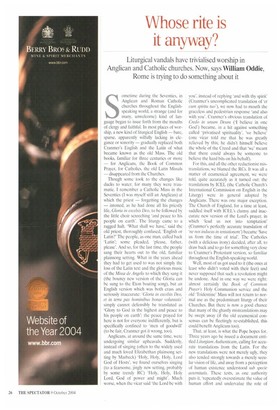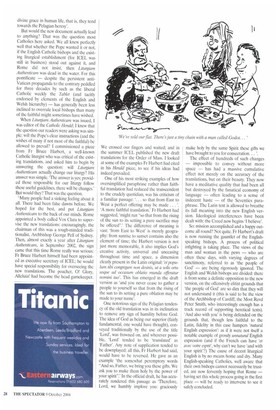Whose rite is
it anyway?
Liturgical vandals have trivialised worship in Anglican and Catholic churches. Now, says William Oddie, Rome is trying to do something about it Sometime during the Seventies, in Anglican and Roman Catholic churches throughout the Englishspeaking world, a strange (and for many, unwelcome) kind of language began to issue forth from the mouths of clergy and faithful. In most places of worship, a new kind of liturgical English — bare, sparse, apparently wilfully lacking in elegance or sonority — gradually replaced both Craniner's English and the Latin of what became known as the old Mass. The old books, familiar for three centuries or more — for Anglicans, the Book of Common Prayer, for Catholics, the old Latin Missals — disappeared from the Churches.
Though some took to the changes like ducks to water, for many they were traumatic. I remember a Catholic Mass in the Seventies (I was myself still an Anglican) at which the priest — forgetting the changes — intoned, as he had done all his priestly life, Gloria in excelsis Deo, to be followed by the little choir screeching 'and peace to his people on earth'. The liturgy came to a ragged halt. 'What shall we have,' said the old priest, thoroughly confused, 'English or Latin?' The people, as one man, called back 'Latin': some pleaded, 'please, father, please'. And so, for the last time, the people sang their hearts out to the old, familiar plainsong setting. What in the years ahead they had to get used to was not simply the loss of the Latin text and the glorious music of the Missa de Angelis to which they sang it (the bouncy new version of the Gloria can be sung to the Eton boating song), but an English version which was both crass and seriously inaccurate: 'Gloria in excelvis Deo, et in terra pax hominibus bonae voluntatis' simply cannot defensibly be translated as 'Glory to God in the highest and peace to his people on earth': the peace prayed for here is not for everyone indifferently, but is specifically confined to 'men of goodwill' (to be fair, Cranmer got it wrong, too).
Anglicans, at around the same time, were undergoing similar upheavals. Suddenly, instead of singing (often to the widely used and much loved Elizabethan plainsong setting by Marbeck) 'Holy, Holy, Holy, Lord God of Hosts', we found ourselves singing (to a fearsome, jingly new setting, probably by some trendy RC) 'Holy, Holy, Holy Lord, God of power and might'. Much worse, when the vicar said 'the Lord be with you', instead of replying 'and with thy spirit' (Cranmer's uncomplicated translation of 'et cum spiritu ruo'), we now had to mouth the graceless and pedestrian response 'and also with you'. Cranmer's obvious translation of Credo in unum Deum (`I believe in one God') became, in a hit against something called 'privatised spirituality', 'we believe' (one vicar told me that he was greatly relieved by this; he didn't himself believe the whole of the Creed and that 'we' meant that there could always be someone to believe the hard bits on his behalf).
For this, and all the other reductionist mistranslations, we blamed the Rs. It was all a matter of ecumenical agreement, we were told, quite accurately as it turned out: the translations by ICEL (the Catholic Church's International Commission on English in the Liturgy) were in general adopted by Anglicans. There was one major exception. The Church of England, for a time at least, saddled itself with ICEL's clumsy and inaccurate new version of the Lord's prayer, in which 'lead us not into temptation' (Cranmer's perfectly accurate translation of 'ne nos inducas in tentationem) became 'Save us from the time of trial'. The Catholics (with a delicious irony) decided, after all, to draw back and to go for something very close to Cranmer's Protestant version, so familiar throughout the English-speaking world.
Well, most of us got used to it (the ones at least who didn't voted with their feet) and never supposed that such a revolution might be undone. And in one way we were right: almost certainly the Book of Common Prayer's Holy Communion service and the old 'Tridentine' Mass will not return to normal use as the predominant liturgy of their Churches. But there is now a good chance that many of the ghastly rn istranslations may be swept away (if the old ecumenical consensus can be fleetingly re-established, this could benefit Anglicans too).
That, at least, is what the Pope hopes for. Three years ago he issued a document entitled Liturgiam Authemicam, calling for accurate translations from the Latin. For the new translations were not merely ugly, they also tended strongly towards a merely secular vision of life, and away from a perception of human existence understood sub specie aetemitatis. These texts, as one authority puts it, 'repeatedly overestimate the value of human effort and undervalue the role of divine grace in human life, that is, they tend towards the Pelagian heresy'.
But would the new document actually lead to anything? That was the question most Catholics here asked. We all knew perfectly well that whether the Pope wanted it or not, if the English Catholic bishops and the existing liturgical establishment (for 10EL was still in business) stood out against it, and Rome did not insist, then Liturgiam Authenticam was dead in the water. For this pontificate — despite the persistent antiVatican propaganda to the contrary peddled for three decades by such as the liberal Catholic weekly the Tablet (and tacitly endorsed by elements of the English and Welsh hierarchy) — has generally been less inclined to overrule local bishops than many of the faithful might sometimes have wished.
When Liturgiam Authenticam was issued, 1 was editor of the Catholic Herald; I knew that the question our readers were asking was simple: will the Pope's clear instructions (and the wishes of many if not most of the faithful) be allowed to prevail? I commissioned a piece from Fr Bruce Harbert, a well-known Catholic liturgist who was critical of the existing translations, and asked him to begin by answering the question: will Liturgiam Authenticam actually change our liturgy? His answer was simple. 'The answer is yes; provided those responsible for our liturgy follow these useful guidelines, there will be changes.' But would they? That was the question.
'1Many people had a sinking feeling about it all. There had been false dawns before. We hoped for the best, and put Liturgiam Authenticam to the back of our minds. Rome appointed a body called Vox Clara to supervise the new translations: encouragingly, the chairman of this was a tough-minded traditionalist. Archbishop George Pell of Sydney. Then, almost exactly a year after Liturgiam Authenficam, in September 2002, the sign came that this time Rome really was serious: Fr Bruce Harbert himself had been appointed as executive secretary of ICEL; he would have special responsibility for overseeing the new translations. The poacher, 0! Glory, Alleluia! had become the head gamekeeper. We crossed our fmgers and waited; and in the summer ICEL published the new draft translations for the Order of Mass. I looked at some of the examples Fr Harbert had cited in his Herald piece, to see if his ideas had indeed prevailed.
One of his most striking examples of how oversimplified paraphrase rather than faithful translation had reduced the transcendent to the crudely quotidian, was his criticism of a familiar passage: '. . . so that from East to West a perfect offering may be made . . . 'A more faithful translation,' Fr Harbert had suggested, 'might run "so that from the rising of the sun to its setting a pure sacrifice may be offered".' The difference of meaning is vast: 'from East to West' is merely geography: from sunrise to sunset contains also the element of time; the Harbert version is not just more memorable, it also implies God's creative activity, universal and unceasing throughout time and space, a dimension clearly present in the Latin original: 'et populum tibi congregare non desinis, ut a solis °du u.sque ad occasum oblatio munda offeratur nomini tuo'. This has emerged in the draft version as 'and you never cease to gather a people to yourself so that from the rising of the sun to its setting a pure oblation may be made to your name',
One notorious sign of the Pelagian tendency of the old translation was in its inclination to remove any sign of humility before God. The idea of God as being our superior (fairly fundamental, one would have thought), conveyed traditionally by the use of the title 'Lord', was frowned on, and wherever possible, 'Lord' tended to be 'translated' as 'Father'. Any note of supplication tended to be downplayed; all this, Fr Harbert had said, would have to be reversed. He gave as an example 'the somewhat peremptory words "And so, Father, we bring you these gifts. We ask you to make them holy by the power of your spirit"! In the official draft, he has accurately rendered this passage as 'Therefore, Lord, we humbly implore you: graciously make holy by the same Spirit these gifts we have brought to you for consecration. . .
The effect of hundreds of such changes — impossible to convey without more space — has had a massive cumulative effect not merely on the accuracy of the translations, but on their beauty. They now have a meditative quality that had been all but destroyed by the fanatical economy of language — often leading to a sense of indecent haste — of the Seventies paraphrase. The Latin text is allowed to breathe its full meaning into the new English version. Ideological interferences have been dealt with: the Creed now begins 'I believe'.
So: mission accomplished and a happy outcome all round? Not quite. Fr Harbert's draft is now running the gauntlet of the Englishspeaking bishops. A process of political infighting is taking place. The views of the man and woman in the pews — who are often these days, with varying degrees of sanctimony, referred to as 'the people of God' — are being rigorously ignored. The English and Welsh bishops are divided: there is from some a definite opposition to the new version, on the offensively elitist grounds that 'the people of God' are so dim that they will not understand it (this is said to be the view of the Archbishop of Cardiff, the Most Revd Peter Smith, who interestingly enough has a track record of supporting heretical texts). 'And also with you' is being defended on the grounds that, though less faithful to the Latin, fidelity in this case hampers 'natural English expression': as if it were not itself a notable example of grossly unnatural English expression (and if the French can have 'et avec votre esprit', why can't we have 'and with your spire?) The cause of decent liturgical English is by no means home and dry. Many English-speaking Catholics, well aware that their own bishops cannot necessarily be trusted, are now fervently hoping that Rome — having set this whole process going in the first place — will be ready to intervene to see it safely concluded.



















































































































 Previous page
Previous page